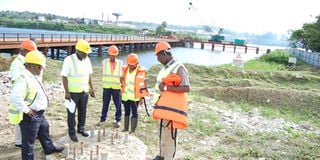Tender row hits Shs390b Jinja bridge project

Works minister John Byabagambi (L) inspects construction work on the new Nile Bridge project on Wednesday. Photo by Denis Edema
What you need to know:
On the spot. IGG investigates allegations that the company which won the tender has no history of working on a cable-stayed bridge, a factor that would compromise its lifespan
Jinja.
The Inspectorate of Government is investigating allegations of impropriety in execution of the contract for building of the new Nile Bridge in Jinja – including the process of the award for the sub-tender to build its superstructure, to Japanese firm Ultracon.
The ‘superstructure’ is the main component of the 525-metre cable-stayed bridges’ strength, and it is alleged that the award of the $29 million (about Shs87 billion) deal to Ultracon, would compromise the integrity of the workmanship and affect its lifespan.
The allegations, including queries about of the sub-tenders for the batching plant and the piling sub-contract are contained in a stinging internal observation report by Mr Kuk Hyung Kim, the consultant bridge engineer substructure/ pylons.
In his report, Mr Kim who has also since recorded a statement before the IGG, alleges that the award of the sub-contract for the “superstructure” to Ultracon could affect the integrity of the structure because the bid by South Korean firm BNG - one of the two best evaluated bidders had better financial terms – and a superior record of previous working experience.
The Uganda National Roads Authority has, however, dismissed the allegations, including claims that the contractor is attempting to change the bridge construction design specifications such as reduction of the rock drilling for the temporary (jetty) bridge and reducing of the iron re-bars being inserted in the holes for the pylons.
UNRA’s director of planning Lawrence Pario told Daily Monitor in an interview at the site in Jinja on April 2 that the sub-tender for construction of the superstructure had not yet been awarded – hence, it was premature for anybody to question the process.
“The consultants will review the award and make recommendations to UNRA,” Mr Pario said.
Works and Transport minister John Byabagambi on Wednesday while on a routine tour of the project revealed that the contractors had admitted that they were behind schedule for six months.
Though he did not reveal the reasons for the delays, Mr Kim has told the IGG investigators that sub-tendering firms who have no technical ability, and change in construction specifications without UNRA’s approval, are some of the issues affecting the project’s implementation.
But in his report, Mr Kim charges that BNG submitted bids of $30 million (about Shs89.8 billion) and $27.8 million (about Shs83.2 billion), whereas Ultracon had bid at $32 million (about Shs95.8 billion) and $30.5 million (about Shs91.3 billion) respectively.
He also points out that Ultracon has never constructed a cable-stayed bridge, anywhere in the world before, like the same under construction in Jinja and therefore lacked the requisite experience to deliver the job in Jinja.
Resignation
Mr Kim has since been asked to leave the project after his observations caused controversy and attracted the IGG’s investigation.
The South Korean consultant handed in his forced resignation letter on March 23, saying he would vacate his position on April 10 due to “personal reasons”.
However, on April 8, IGG Irene Mulyagonja summoned Mr Kim to report to the Inspectorate until the investigations are finished.
On April 13, Mr Kim recorded a statement before the IGG’s investigators, in which the South Korean consultant maintained that the designs for the construction of the bridges structure have been changed without approval from UNRA.
In his statements to the IGG investigators, Mr Kim states that the award of the sub-tenders done without transparency and winning firms were being handpicked by Mr Hiroyasu Nakayama, the project manager, and Mr Kim hyunpil, the project’s head of procurement.
Ms Mulyagonja told Daily Monitor on Wednesday that the inspectorate was still investigating the allegations and would issue a report after concluding the inquiry.
Earlier controversy included the sub-tender for the batching plant, which was controversially awarded to Prism, a company incorporated in South Sudan – despite a June 25, 2014 protest letter from the then director of planning at UNRA, Mr David Luyimbazi.
However, Zenitaka-Hyundai, the contractors, proceeded and signed two contracts on July 2, 2014 - sub-contracting Prism and another “Lease Agreement”. This was calculated to beat off the UNRA protest because the contractor and Prism then signed an MoU ring-fencing the sub-contract.
Mr Pario says UNRA had intervened to force the contractor to take responsibility for the batching operations, and according to the authority, the leasing agreement took precedence.
“The consultants have assured UNRA that the contractor is in charge of the batching plant and materials are being produced to the required specifications,” Mr Pario said.
He also dismissed allegations that Sato Corporation Ltd, which was awarded the sub-tender for the piling work lacked capacity and did not have enough staff strength to undertake the contract. “As you can see, most of the work here is highly mechanised,” he said during a visit to the project site with this writer.
More information on the Nile bridge
The new Nile Bridge is 525m-long with a projected lifespan of 100-years. The government is implementing the $130m (about Shs390 billion) project with the help of a loan from the Japan International Cooperation Agency (Jica). Jica contributed $100 million.
The bridge is expected to secure traffic and transport on the Northern Corridor Route and enhance trade volumes with East Africa countries. The Zenitaka-Hundai joint venture, are the contractors, while Ms Oriental Consultants, lead the three consulting companies supervising the construction, including Korean firm – Pyungwa Engineering Consultants.




